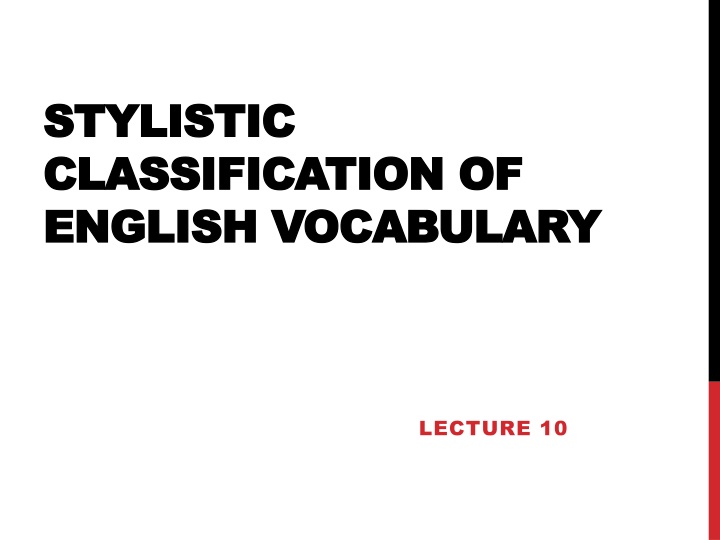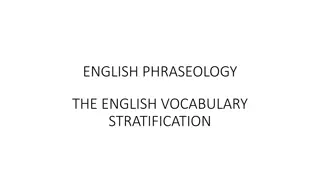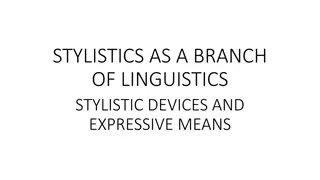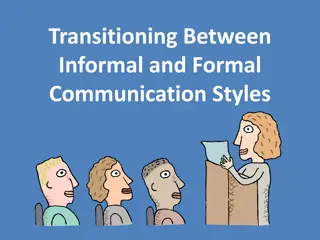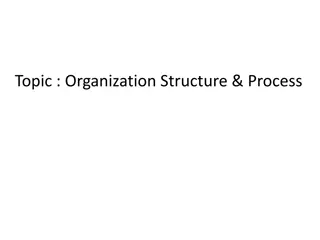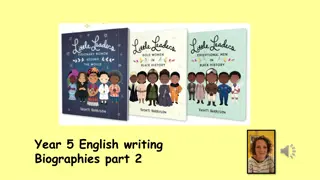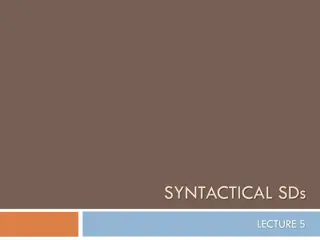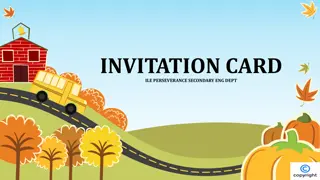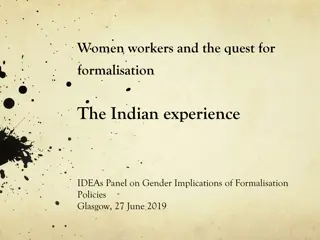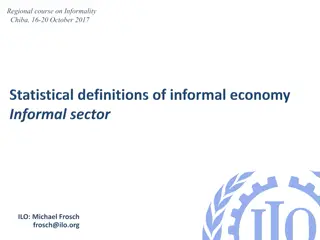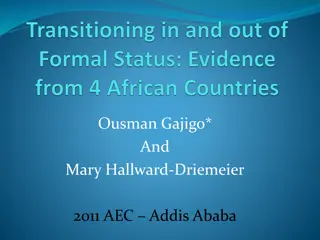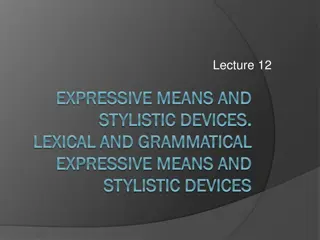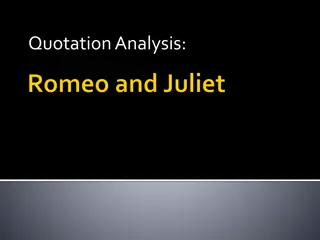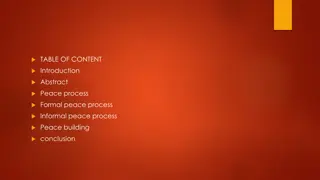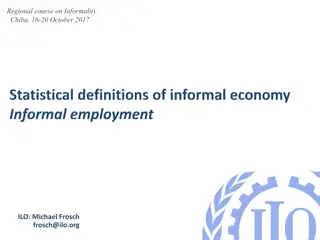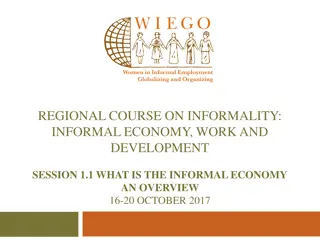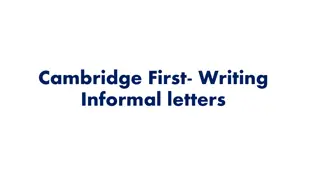Stylistic Classification of English Vocabulary: Formal, Informal, and Literary Words
Stylistic classification of English vocabulary explores the nuances and distinctions between formal, informal, and literary words. It delves into how words are uniquely used in different contexts, reflecting varying levels of sophistication and social spheres. From indispensable words to special sphere vocabulary, this classification sheds light on the stylistic coloring that words carry. Formal (bookish), neutral, and informal (colloquial) vocabularies are dissected, highlighting the diverse linguistic realms they belong to. Discover the layers of literary and colloquial words, each catering to specific communicative needs in official, scientific, and daily exchanges.
Download Presentation

Please find below an Image/Link to download the presentation.
The content on the website is provided AS IS for your information and personal use only. It may not be sold, licensed, or shared on other websites without obtaining consent from the author.If you encounter any issues during the download, it is possible that the publisher has removed the file from their server.
You are allowed to download the files provided on this website for personal or commercial use, subject to the condition that they are used lawfully. All files are the property of their respective owners.
The content on the website is provided AS IS for your information and personal use only. It may not be sold, licensed, or shared on other websites without obtaining consent from the author.
E N D
Presentation Transcript
STYLISTIC STYLISTIC CLASSIFICATION OF CLASSIFICATION OF ENGLISH VOCABULARY ENGLISH VOCABULARY LECTURE 10
STYLISTIC CLASSIFICATION OF ENGLISH VOCABULARY 10.1. Stylistic Classification of English Vocabulary. 10.2. Formal Vocabulary. 10.3. Informal Vocabulary.
words are not used in speech to the same ex- tent; certain words occur less frequently than others; words that are indispensable in every act of communication have nothing particular about them and cause no definite associations; words used only in special spheres of linguistic intercourse have something attached to their meaning, a certain stylistic colouring.
Indispensable words are stylistically neutral. Words of special spheres are stylistically coloured. Certain groups of stylistically coloured words are formed by words with a tinge of officiality or refinement about them. Other groups of stylistically coloured words are used in socially lower sphere. These two groups form literary and colloquial strata respectively.
Formal (bookish) vocabulary Neutral (unmarked) vocabulary Informal (colloquial, sub-neutral) vocabulary DECESE ATTIRE DECLINE DIE CLOTHES REFUSE SNUFF IT RAGS TURN DOWN
Literary words serve to satisfy communicative demands of official, scientific, poetic messages. Colloquial words are employed in non-official everyday communication. Each layer is further divided into the common and special bulks Common literary and Special literary Common colloquial and Special colloquial
FORMAL VOCABULARY Literary (bookish) words belong to that stratum of the vocabulary which is used in cultivated speech: books, official papers and documents, scientific communication, high poetry, author's speech of creative prose, special types of oral communication: public speeches, official negotiations, etc. Bookish words are mostly loan-words, Latin and Greek. They are either high-flown synonyms of neutral words, or popular terms of science.
FORMAL VOCABULARY Common literary are easily recognized words and widely used by the majority of native and non- native speakers, e.g. sophisticated, fabulous. They contribute to the message the tone of solemnity, sophistication, seriousness, gravity, learnedness, cf.: He began to answer vs He commenced his rejoinder
FORMAL VOCABULARY Special literary words comprises: Terms Archaic words Poetic words Foreign words Barbarisms Neologisms
FORMAL VOCABULARY Terms words denoting objects, processes, phenomena of science, humanities, technique. They may be subdivided into: Popular terms of some special spheres of human knowledge known to the public at large (e.g. typhoid, pneumonia); Terms used exclusively within a profession (e.g. morpheme). Archaisms words which are practically out of use in present-day language and are felt as obsolete. They are subdivided into 2 groups: Historical words, denoting historical phenomena which are no more in use (e.g. yeoman, vassal, falconet). Archaic words (archaic forms) proper those which disappeared in the course of language history and were substituted by newer synonymic words (e.g. thou wilt you will; brethren brothers).
FORMAL VOCABULARY Poetic words are used exclusively in poetry and the like. Many of these words are archaic: e.g. foe (enemy), realm (kingdom). Others are morphological variants of neutral words: oft (often), list (listen), morn (morning). F r ign words (neglige, au revoir, Bundeswehr) are words and phrases loaned from other languages. These words haven't undergone grammatical or phonetic assimilation. Fr.: bonjour, Ital.: dolce far niente. Lat.: alter ego, mirabile dictu.
FORMAL VOCABULARY Barbarisms are foreign words which have exact equivalents in the language thus being unnecessary: e.g. chic (stylish); bon mot (a clever or witty saying). They are considered to be part of the vocabulary of the given language constituting its peripheral layer. They are usually registered in dictionaries (apropos, vis-a-vis, etc.). Neologisms are new words or expressions. These words have the connotation of novelty. Mainly these are terms with both new form and new meaning, e.g. audio typing; computer-buyer; to telecommute; electronic cottage.
INFORMAL VOCABULARY Common colloquial are words with a tinge of familiarity or inofficiality about them. There is nothing ethically improper in their stylistic coloring, except that they cannot be used in official forms of speech. Colloquial words mark the message as informal, non-official, conversational. Neutral vocabulary: His father has died. Informal vocabulary: His old man has kicked away.
INFORMAL VOCABULARY Special colloquial words are slang words, jargonisms, vulgarisms and dialectal words. Slang words are highly emotive and expressive. They lose their originality rather fast and are replaced by newer formations: e.g. go crackers (go mad); guru (god); belt up (keep silence); big- head (a boaster).
INFORMAL VOCABULARY Jargonisms replace those words which already exist in the language and stand close to slang (substandard, expressive and emotive), but, unlike slang they are used by limited groups of people, united either professionally or socially. Professionalisms are unofficial substitutes of professional terms. They are used by representatives of the profession to facilitate the communication. e.g. bull (one who buys shares at the stock-exchange); bear (one who sells shares). Social jargonisms are words used to denote non-professional things relevant for representatives of the given social group with common interests (e.g. music fans, drug-addicts, thieves, etc). Very often they are used for the purpose of making speech incoherent to outsiders.
INFORMAL VOCABULARY Vulgarisms are coarse words with a strong emotive meaning, mostly derogatory, normally avoided in polite conversation. e.g. There is so much bad shit between the two gangs that I bet there will be more killings this year. The border-line between colloquialisms, slang words and vulgarisms is often hard to draw for there are hardly any linguistic criteria of discrimination. Dialectal words are normative and devoid of any stylistic meaning in regional dialects, but used outside of them, carry a strong flavour of the locality where they belong. e.g. baccy (tobacco), unbeknown (unknown).
